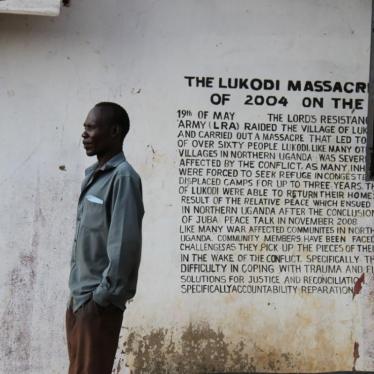(New York) - A new law supposedly protecting U.S. servicemembers from the International Criminal Court shows that the Bush administration will stop at nothing in its campaign against the court.
U.S. President George Bush today signed into law the American Servicemembers Protection Act of 2002, which is intended to intimidate countries that ratify the treaty for the International Criminal Court (ICC). The new law authorizes the use of military force to liberate any American or citizen of a U.S.-allied country being held by the court, which is located in The Hague. This provision, dubbed the "Hague invasion clause," has caused a strong reaction from U.S. allies around the world, particularly in the Netherlands.
In addition, the law provides for the withdrawal of U.S. military assistance from countries ratifying the ICC treaty, and restricts U.S. participation in United Nations peacekeeping unless the United States obtains immunity from prosecution. At the same time, these provisions can be waived by the president on "national interest" grounds.
"The states that have ratified this treaty are trying to strengthen the rule of law," said Richard Dicker, director of the International Justice Program at Human Rights Watch. "The Bush administration is trying to punish them for that."
Dicker pointed out that many of the ICC's biggest supporters are fragile democracies and countries emerging from human rights crises, such as Sierra Leone, Argentina and Fiji.
The law is part of a multi-pronged U.S. effort against the International Criminal Court. On May 6, in an unprecedented move, the Bush administration announced it was "renouncing" U.S. signature on the treaty. In June, the administration vetoed continuation of the U.N. peacekeeping force in Bosnia in an effort to obtain permanent immunity for U.N. peacekeepers. In July, U.S. officials launched a campaign around the world to obtain bilateral agreements that would grant immunity for Americans from the court's authority. Yesterday, Washington announced that it obtained such an agreement from Romania.
However, another provision of the bill allows the United States to assist international efforts to bring to justice those accused of genocide, war crimes or crimes against humanity - including efforts by the ICC.
"The administration never misses an opportunity to gratuitously antagonize its allies on the ICC," said Dicker. "But it's also true that the new law has more loopholes than a block of Swiss cheese."
Dicker said the law gives the administration discretion to override ASPA's noxious effects on a case-by-case basis. Washington may try to use this to strong-arm additional concessions from the states that support the court, but Dicker urged states supporting the ICC "not to fall into the U.S. trap: the law does not require any punitive measures."
Human Rights Watch believes the International Criminal Court has the potential to be the most important human rights institution created in 50 years, and urged regional groups of states, such as the European Union, to condemn the new law and resist Washington's attempts to obtain bilateral exemption arrangements.
The law formed part of the 2002 Supplemental Appropriations Act for Further Recovery from and Response to Terrorist Attacks on the United States.
U.S.: 'Hague Invasion Act' Becomes Law
White House
Your tax deductible gift can help stop human rights violations and save lives around the world.
Region / Country
Most Viewed
-
December 16, 2015
Syria: Stories Behind Photos of Killed Detainees

-
December 16, 2015
If the Dead Could Speak

-
August 29, 2024
South Korea’s Digital Sex Crime Deepfake Crisis

-
November 25, 2019
A Dirty Investment

-
October 16, 2012
Death of a Dictator


